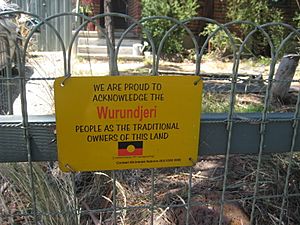Land acknowledgement facts for kids

A land acknowledgement is a special statement. It is a way to formally recognize that an event is happening on land that was originally home to indigenous peoples. You often hear these statements at the start of public gatherings or events. They have also become popular on social media profiles.
Contents
What is a Land Acknowledgement?
A land acknowledgement is a way to show respect for the original inhabitants of a place. It helps people remember the history of the land they are on. It also recognizes the deep connection indigenous peoples have to their traditional territories.
Land Acknowledgements Around the World
Many countries are now using land acknowledgements. This practice helps to honor the history and culture of indigenous communities worldwide.
Australia: Welcome to Country
In Australia, people use a "Welcome to Country" or "Acknowledgement of Country." This is a special ritual that highlights the cultural importance of an area to a specific Aboriginal Australian or Torres Strait Islander group. These ceremonies have been happening since the 1970s and became more common in the early 2000s.
They are important because they challenge the old idea of terra nullius. This Latin phrase means "land belonging to no one." It was a false idea used by colonists to claim land that was already inhabited. The Mabo decision in 1992 overturned this idea, recognizing the land rights of Indigenous Australians.
Canada: Recognizing Indigenous History
In Canada, land acknowledgements became more common after 2015. This was when the Truth and Reconciliation Commission of Canada released its report. The report showed how the country's Canadian Indian residential school system had caused great harm to Indigenous children and their cultures.
After this report and the election of Prime Minister Justin Trudeau, these acknowledgements became a regular practice. You can now hear them at many events, including National Hockey League games, ballet performances, and government meetings.
United States: Growing Recognition
In the United States, land acknowledgements are also becoming more common. This movement started with museums on the East Coast. Over the past few years, it has spread west to universities, non-profit groups, and local governments.
The practice gained more attention after the filmmaker Taika Waititi made a land acknowledgement at the Oscars in 2020. Organizations like Every*Learner*Everywhere (supported by the Bill & Melinda Gates Foundation) offer resources on how to create these statements. Some music albums, like Fetch the Bolt Cutters by Fiona Apple and Time Skiffs by Animal Collective, have even included land acknowledgements in their liner notes.
Challenges and Discussions
Some people have different opinions about land acknowledgements. Critics sometimes say they are just "empty gestures" that don't truly help indigenous communities. They worry that these statements might not lead to real actions to address important issues.
It can also be tricky to make sure acknowledgements are completely accurate. This is because different indigenous groups might have overlapping land claims. Sometimes, old land exchanges between groups were not written down, making it hard to know the exact history.

